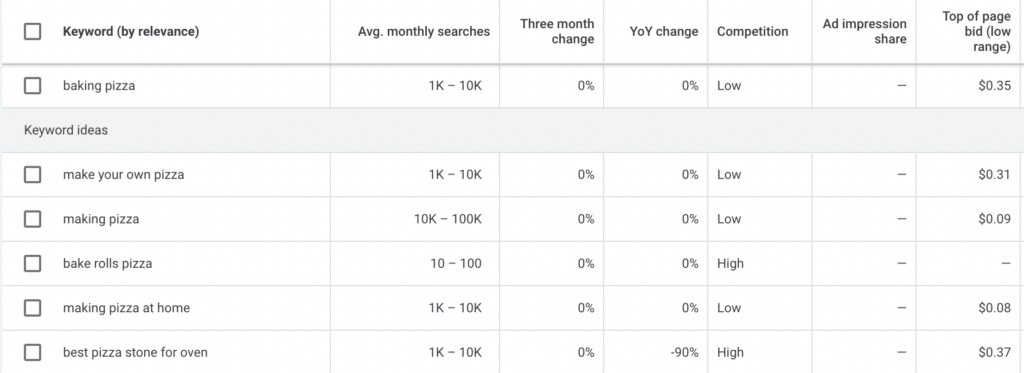Search engine optimization is too often overlooked by authors. But SEO for authors is a vital knowledge set that can make the difference between a successful book and a total flop.
While website SEO can be a complex, ever-changing task that requires teams of people to get right, book SEO is a little simpler. You’re not optimizing pages upon pages of content. For the most part, you only need to optimize a few things: your book’s title, subtitle, and description.
In this article, we’ll cover:
Finding the Right Keywords
As an author, your objectives are closely tied to gaining more readers. Getting the word out about your book to people who are interested in its topic or genre but who have never heard of your book specifically can seem daunting. How do you reach those people?
Let’s consider the example of a book about baking pizza. Imagine you’re publishing a book about the ultimate home pizza baking techniques. Your aim is to locate those who are actively seeking this information. Since pizza is the top-selling fast food in the United States, surpassing burgers, tacos, and other options, we understand its popularity. Furthermore, the growing interest in home cooking, slow food, and artisanal culinary practices adds to the potential audience.
This is where the concept of keywords comes into play. Keywords are essentially the words and phrases that people use when searching for specific content. However, relying solely on single keywords, like “pizza,” is ineffective for a nonfiction author in the realm of home pizza baking. These keywords are too broad. A search using such a generic term would yield results primarily related to local pizza chains like Domino’s, Pizza Hut, and Little Caesar’s. And because it’s such a broad term with millions of websites competing for search engine rankings, your chances of landing on the first page are slim.
Now, let’s introduce you to an excellent tool that can aid the exploration of your niche. It’s called the Google Ads Keyword Planner. While various keyword tools are available, this one stands out for its user-friendliness and being free. It’s a fantastic starting point. (Please note: Access to the Keyword Planner tool now requires logging into Google Ads, but you can get a Google Ads account for free.)

Getting Deep with Keywords
Google offers the Keyword Planner primarily to advertisers who use their Google Ads program, a platform to purchase keywords and associated searches. However, let’s focus on the tool itself:

I entered the term “baking pizza” into the keyword box and it returned all of the relevant search terms (“relevant” based on Google’s own algorithms). As you can see, the most relevant term it returned was “make your own pizza,” with between 1,000 and 10,000 searches per month, followed by “making pizza,” with between 10,000 and 100,000 searches per month. This is useful information, especially since “making pizza” seems to have a much higher search volume than “baking pizza.” This could indicate that we need to rethink the keywords we’re using, and might even need to change our book’s title.
However, the true value for niche marketers lies in delving deeper into the list to discover hidden gems. This is where you’ll gain insights into your target audience—the people most likely interested in your book and related programs. Above this section, there’s another section called “Broaden your search.”

The list begins with short keywords such as “pizza” and “pizza delivery”—valuable terms for companies seeking to attract buyers looking to order a pizza. The next keyword, though, is the one that offers some real gold: “cooking pizza.”
From there, go back down to the “Keyword ideas” section and start scrolling through for keywords that seem relevant to your book. One keyword variation that shows up repeatedly in this particular search is anything related to cooking pizza (or pizza rolls) in an air fryer (some of which have search volumes in the 10,000 to 100,000 range). That’s a testament to how popular the air fryer has become in the last couple of years!
Keep in mind that each of these long-tail keyword phrases (more on the long tail later) can lead to even more keywords. For instance, if I input “making pizza dough” and perform another search, I’ll receive a fresh set of keyword results, including “pizza dough recipe” with between 100,000 and 1 million monthly searches.
SEO for Authors: Deciding Which Keywords to Target
It can be tempting to try to go for those really high-volume searches. But this is where search intent can come into play. Using the above example, “pizza dough recipe” with it’s potential 1 million searches per month, might seem like a great keyword to target.
If you go to Google, though, and type in that term, you’ll find that all of the results on the first page are for recipes for pizza dough. They’re not for books detailing how to make the best pizza dough. Getting a cookbook to rank highly for that keyword would be close to impossible. (You could, however, set up a website that includes one of the pizza dough recipe from your book, attempt to rank on the first page, and then hope some of those readers convert into buyers.)
One of the easiest ways to figure out if a keyword is worth trying to rank for is to look at the product results that sometimes appear at the top of Google search results pages. If you come across a keyword where there are multiple books featured in that section, that’s a keyword worth targeting!
Long Tail Keywords
In the past, when it cost a lot to develop, produce and market products, businesses concentrated on blockbusters, or “hits” that would appeal to the widest possible audience. This capitalized on the “head” of the purchasing curve, where it was thought that most of the money was to be made.
As the cost to create and distribute products has fallen, largely due to digitization and the ability to market online, it has become apparent that the “long tail” of the purchasing curve contains potentially as much business as the “head.” Not only that, but each product in the “tail,” although it appeals to only a small segment of the population, is perfectly tailored to just that group of people. One thing this means is that if you can make those people aware of the product, they are much more likely to buy it.
The Long Tail and Nonfiction Publishing
In a sense, most nonfiction books are marketing-driven because they are often written for a specific niche. And the more specialized the book is, the more likely it will find success within the group of people who are intensely interested in that niche.
When I was studying pizza making, for instance, I read almost every book I could find on baking artisanal pizza at home. This is a typical long-tail niche. Here’s how it might look as you travel from the “head” to the “tail.” Imagine you are the publisher or self-publishing author of a book on serious home pizza baking.
- Cooking – this is the head of the curve, lots of people are interested in what is a huge market. But it’s too big a designation for actual sales appeal.
- Baking – here we’ve narrowed to only one aspect of cooking, coming down the purchase curve, but still in a very large category. I’m interested in pizza, not panettone or pastries.
- Yeast Breads – at this point we start to enter the long tail, since this category is much more specific, and people looking here are much more likely to be interested in your books.
- Flatbreads – even farther down the tail, this subset of yeasted breads is of interest to only a small segment of the cooking/baking population, but they are highly engaged.
- Pizza – although this particular tail ends here, another “long tail” begins with all books on making pizza and grows its own tail, with specialties such as deep-dish pizza baking, cornmeal crust pizza baking, and so on.
Two Developments that Supercharged Nonfiction Niche Publishing
When the development and marketing of products was concentrated on the “hits,” it was very expensive to create products and market them to a large enough population to ensure success. But two developments took the inherent “long tail” mindset of nonfiction publishing to a new level:
- Internet marketing made it possible, for very little money, to attract just those people intensely interested in your niche. On discussion boards, blogs, forums and in discussion groups on community websites, people have congregated to talk about every possible activity you can imagine, from the care of your tropical fish to digital photography to genealogy to pizza baking.
- Digital printing with print on demand distribution essentially eliminated most of the cost of getting a book into print.
These two developments alone have created a marketplace that rewards businesses and authors who can fulfill the needs of a small group of people. When you combine specialized information that experts in a field commonly possess with very targeted marketing and automated web delivery systems for either printed or electronic books, you’ve got a long tail marketing machine.
A Note About Author Platforms
A lot of people entering self-publishing have little or no web presence before they begin the publishing process. Or at least little or no professional web presence.
Maybe they have a personal blog or social media accounts. But unless they’re using those platforms to talk about their writing (or at least the topic that they write about), it’s not really a platform. An author platform includes:
- active blogging on your specialty, and/or
- Facebook marketing through fan pages and regular updates, and/or
- developing a Twitter profile and connecting to people with similar interests, and/or
- posting visual content on Instagram or TikTok regularly (BookTok is particularly popular, especially if your readers are in a younger demographic), and/or
- connecting on other sites appropriate for your subject area. Lots of business-oriented publishers congregate on LinkedIn, for instance, and there are subject-oriented online communities centered around most topics.
As an author in whatever field you write in, you need to become familiar with these social settings. This is where people interested in your topic “hang out” and where you can learn what their interests, their problems, and their needs are. And they can get to know you and your expertise.
Interacting in these social media spaces helps to establish your expertise as well. All of these efforts will bear fruit when it comes time to market your book.
In addition, you’ll likely want to set up at least a basic author website that lists your books and a bit about your background. Give people a single point of reference if they’re interested in your work, rather than just telling them to “look you up on Amazon.”
Regardless of where you call “home” online, be sure that you’re using those keywords you’ve identified as relevant to your books on a regular basis. And on social media, look to relevant hashtags as well.

SEO for Authors Applies to Titles, Too
In advertising, it’s said, 80% of the effectiveness of your ad depends on your headline. Brian Clark of Copyblogger says:
Your headline is the first, and perhaps only, impression you make on a prospective reader. Without a compelling promise that turns a browser into a reader, the rest of your words may as well not even exist. From a copywriting…standpoint, writing great headlines is a critical skill.
Book titles, meant to entice a reader into a purchase, need to be even more effective than headlines. But book titles often seem like an afterthought, or maybe a title the author has been carrying around in their head for many years. Titles can be chosen for any number of reasonable or completely frivolous reasons.
But the success of your book might well depend on your book title and/or subtitle. Much like an article or advertising headline, your book’s title and subtitle are both vital to getting readers interested. While a great title won’t cover up for a bad book, a bad title may prevent the success of a good book.
For instance, F. Scott Fitzgerald’s The Great Gatsby was originally called Trimalchio in West Egg. Don’t you wonder what the book’s fate would have been if Fitzgerald had used his original name?
Once you get finished finding exactly the right title, stop and think about the world in which your book will be sold. Particularly for nonfiction books, one of the chief ways people will find your book is through search, specifically through online searches either on Google or Amazon.
Since we know that careful study and use of keywords can be influential in how people find our books (as well as our blog posts, articles and other online writing) we can use this information to help guide us to better book titles.
Titles for Humans and for (Search) Robots
Here are some examples of titles that work well for both of your constituencies: the person browsing in a bookstore or at an online retailer, and the robots sent out by search engines to catalog the web. Take a look at these titles and see if you can spot the pattern, the way they were carefully crafted on both ends.
- The Devil’s Casino: Friendship, Betrayal, and the High Stakes Games Played Inside Lehman Brothers
- In Command of History: Churchill Fighting and Writing the Second World War
- Black Wave: A Family’s Adventure at Sea and the Disaster That Saved Them
- Bright-Sided: How the Relentless Promotion of Positive Thinking Has Undermined America
- Dancing in the Dark: A Cultural History of the Great Depression
- The First Tycoon: The Epic Life of Cornelius Vanderbilt,
- Golden Dreams: California in an Age of Abundance
- The Last Empress: Madame Chiang Kai-Shek and the Birth of Modern China
- Nothing to Envy: Ordinary Lives in North Korea
- The Snakehead: An Epic Tale of the Chinatown Underworld and the American Dream
- The Wilderness Warrior: Theodore Roosevelt and the Crusade for America
In each case, a punchy, evocative title grabs attention and attempts to create curiosity, suspense or interest in the reader. Then comes the subtitle. These are typically longer than the title and have two equally important roles to play:
- The subtitle has to adequately convey, at a glance, what the actual subject matter and scope of the book is.
- The subtitle also has to contain the one or two critical keywords that best represent your book.
While the title addresses the human browser, the subtitle has to flag the search engine algorithms with keywords that will turn up in any relevant search on your topic. Look through the list above again. In each case, the punchy title is followed by keyword-rich descriptions. Each subtitle is far more specific than its corresponding title. In fact, without the subtitles, many of these titles would tell you almost nothing about the book they were attached to.
As almost all book discovery moves to digital databases and online searches, more and more of your success will rely on your ability to alert searchers—both robotic and human—to the worthiness of your book when they search for relevant keywords for your subject area.
These are the same keywords to use in filling out bibliographic information for Books in Print on Bowkerlink, to incorporate in your catalog copy and any descriptions of the book you write, or any press materials, media releases, or sales copy.
This combination of title and subtitle gives you the greatest chance of your book being found by exactly the right people. Put some really good thinking behind your choices—it will serve you well.
SEO Can Make or Break Your Book’s Success
SEO for authors and their books isn’t as complicated as creating an SEO strategy for an entire website. It just takes a little bit of time and forethought to create a keyword strategy and implementation plan that will get your books in front of the readers who are actually looking for them.
Editor’s note: This post is a compilation of some of Joel Friedlander’s best SEO advice for authors, updated for 2023.



